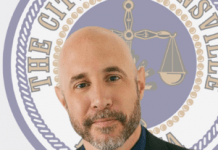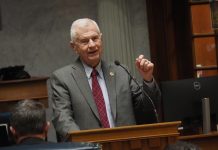GAVEL GAMUT
By Jim Redwine
www.jamesmredwine.com
(Week of 30 June 2025)
THE BEST CELEBRATION
The Fourth of July has slowly gained prominence in my pantheon of special commemorations. Once all seasons paled next to Christmas with the memories of the autumnal aromas of oyster dressing and pumpkin pie fading away to electric trains and baseball mitts. Easter was okay because school would soon be out and girls in pink dresses with blue satin sashes would dash about exposing their laughter and crinoline. But the Fourth of July brought ice cold pop, firecrackers and roman candle battles. However, as a commemoration it seemed to mean a great deal to my elders, but for me it just presaged a return to a regimen of school that broke into my summer freedom.
I am not sure when the trappings of the Fourth began the metamorphosis into my imperceptible awareness that America and I had already struggled through numerous radical stages and, alarmingly and expectantly, might face many more as a man and a country. I think the true reasons the Fourth deserves its place at the head of commemorations began to seep into my consciousness the first time my large and gentle father took me with him to collect a Metropolitan Life Insurance Company policy monthly premium from a Colored family who lived across Bird Creek in a two-room clapboard house with a front porch held up by blackjack oak saplings.
We drove across the Bird Creek bridge in our family’s 1954 Ford sedan. On the way we stopped at Henry’s Bar-B-Q to buy what Dad called heaven’s own ribs. Dad was called “Mister Metropolitan” by Henry and Dad made sure I called the old Colored man “Mister” too. The two sections of two ribs and two Grapette pops cost about a dollar. Dad had bad heart trouble and Mom would not let him eat those beloved fatback pork ribs unless he sneaked over to Henry’s. They were worth any old heart attack as far as Dad was concerned.
After we savored that hickory smoked ambrosia, we drove about another quarter mile up the dirt road of Colored town to Dad’s customer’s house. He told me to stay in the car but I was already out and on the porch before he got the words out. A skinny Colored woman wearing a yellow flour-bag gingham dress and a denim wash rag as an apron opened the screen door and said, “Lord’a mercy, Mr. Metropolitan, is it premium time again already?” Her eyes were downcast.
Dad said, “Son, run back to the car and get my debit book. I must have made a mistake”. I hustled to the front seat to get Dad’s account book and returned just in time to see him taking his hand from his hip pocket.
Then he gently said, “Alright, boy, we better get back before your mother figures out where we went”. We left and I realized somehow the premium had been paid. I think that was my earliest understanding of what possibilities America afforded. Our family was about like all white families in our little town yet Mom and Dad knew from their own Great Depression Days that in America there is always hope if we all help one another. I like to think that that Black family paid forward some of the money that came from that life insurance policy to help someone else.
It took several more years of living with a slowly changing society of segregated schools, restaurants and churches, but I finally learned what the Fourth of July truly meant in 1964 when I returned from where I was stationed in the United States Air Force to attend Dad’s funeral. Our church had a large sanctuary surrounded on three sides with a balcony. When I walked into the church with Mom and looked up, the balcony was filled with Black people who stood in respect for Mom and Mr. Metropolitan.
Black people had never been allowed in our church, but the woman I saw that day years before with Dad was there with her family as were numerous other Black people from across Bird Creek. Later my sister told me that Black lady had come by our house and asked Mom if Colored folks could attend Mr. Metropolitan’s funeral. Mom had to get Church Board permission which was granted only after Mom threatened to leave the church. Coloreds would be allowed that one time if they sat in the balcony, but that was a sea change many years in the making.
That day was when I knew America had the capacity to atone for past sins, and that was when the Fourth of July became my favorite holiday.
For more Gavel Gamut articles go to www.jamesmredwine.com





